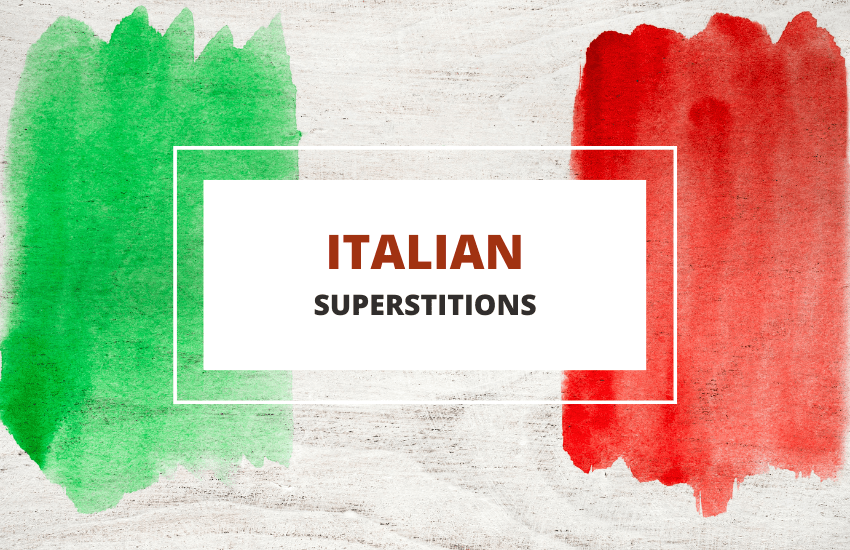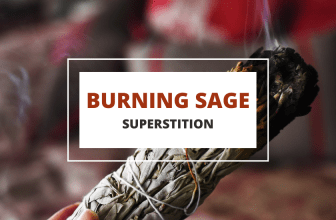
Table of Contents
Italy has a long and colorful history as well as a very rich culture, so it does not come as a surprise for the locals to have many superstitions that they still swear by to this day. If you are planning to visit Italy or are simply curious about their culture, it helps to understand the beliefs that the locals stand by. Here is a list of 15 popular superstitions in the country:
Sweeping Over the Feet of an Unmarried Woman

Italians believe that when a broom passes over the feet of a woman who has yet to marry, her future nuptial prospects will be ruined. Because of this, it is common for people who are sweeping the floor to ask single women to lift their feet. This superstition originates from an old-fashioned belief that women need to be good at housework in order to snatch a husband, and a woman who mistakenly sweeps her feet while sweeping is a poor housekeeper.
Breaking a Mirror
There are many variations to this superstition. The first one claims that when you break a mirror by accident, you will experience bad luck for seven consecutive years. Another version claims that if the mirror breaks on its own for no reason, it is an ominous sign of someone’s impending death. If the mirror was displayed beside a person’s portrait at the time when it broke, then the person in the photo is the one who would die.
Leaving a Hat on the Bed
Italians believe that you should not leave a hat on the bed, regardless of who owns the bed or the hat, for fear that it would bring back luck to whoever sleeps there. This belief stems from the old practice of priests, where they placed their hats on the bed of a dying person. When the priest comes to receive a person’s deathbed confession, he removes his hat and places it on the bed so he can put on his vestments for the ritual.
Avoiding The Evil Eye
Be careful of how you look at other people in Italy to avoid being accused of giving the evil eye, which is a malicious glance from a jealous or vindictive person. Similar to jinxes or curses in other countries, the evil eye is believed to cast bad luck on the other person. To ward off the effects of the evil eye, the recipient has to make a specific hand gesture to imitate the appearance of horns or wear a horn-like amulet called the “cornetto”.
Skipping Friday the 17th
The number 13 is more popular around the world as an unlucky number, especially if the date falls on Friday. However, in Italy, it is the number 17 that is considered to be ominous to the point that some people have a phobia of the number.
This fear is mostly rooted in religion since the country is predominantly Catholic. It is said that Jesus, the spiritual leader of the Catholic Church, died on Friday the 17th. The biblical flood in the book of Genesis also happened on the 17th of the month. Lastly, the Latin numerals for 17 have an anagram that means “I have lived”, a foreboding statement that refers to life in the past tense.
Avoiding Sending Birthday Greetings in Advance

It is considered bad luck in Italy to greet someone with a happy birthday before the actual date. This is because they believe that this is a pre-emptive action that may bring misfortune to the celebrant. However, there is no known cause or reason for this superstition.
Preventing Salt and Oil from Spilling
Take care of your salt and oil when you are in Italy because it is considered bad luck if they spill. This belief traces its roots in the country’s history, particularly the trading practices during ancient times. Olive oil was a luxurious item at the time, so spilling even just a few drops were considered a big waste of money. Salt was an even more valuable commodity, to the point that it was used to pay soldiers for their military services.
Touching Iron for Good Luck
What originally started as a habit of touching horseshoes to attract blessings, this superstition eventually evolved to just touching anything that is made of iron. Horseshoes are believed to have the power to ward off witches and evil spirits, and it used to be a common practice to nail one on the front door as a form of protection for the household. Eventually, this belief was carried over to just iron in general, and thus Italians would say “tocca Ferro (touch iron)” to wish someone good luck.
Sprinkling Salt to Bless a New Home
When moving to a new home, Italians would sprinkle salt in the corners of all the rooms. They believe this will drive out evil spirits and purify the area. Related to this is another superstition that salt can help the departed souls to rest in peace, which is why it is also a common practice in Italy to place salt under the head of the deceased before burial.
Placing Bread Loaf Bottom Up
When placing a loaf of bread on the table or shelf, ensure it is properly standing with the bottom facing upwards. Italian believe that bread is a symbol of life; hence placing it upside down will translate to misfortune because it is the same as reversing your life’s blessings.
Replicating the Cross

Be careful when laying down objects like pens, utensils, or toothpicks, and make sure that they don’t form the shape of the cross. This is another superstition deeply steeped in the country’s religious roots, which has a large population of Christians and Catholics. The cross is a religious symbol for Christians because their spiritual leader, Jesus Christ, died via crucifixion.
Eating Lentils for Luck
It has been a long-time tradition in Italy to serve dishes made with lentils on the eve or the day of the New Year. Lentils are shaped like coins, which is why Italians believe that eating them at the start of the year will usher in wealth and financial success for the next 12 months.
Opening an Umbrella Indoors
Wait until you leave the house or building before opening an umbrella in Italy. There are two reasons why it is considered bad luck to unfold an umbrella indoors. The first one is based on an ancient pagan practice where the act is perceived to be an insult to the Sun god. The other reason is more secular in that poor households would use an umbrella inside the house as an emergency solution during the rainy season since their roofs would often have holes where water would easily seep in.
Walking Under a Ladder
If you see a ladder while walking along the streets of Italy, do not walk under it but try to circle around it instead. Aside from safety reasons, it is also considered a sign of disrespect in the Christian faith to pass by below a ladder. This is because an opened ladder resembles a triangle, which represents the Holy Trinity in the Christian religion, or the triumvirate of the Father (God), the Son (Jesus), and the Holy Spirit. Thus, walking under this symbol is an act of defiance against them.
Black Cat Crossing Your Path
It is considered to be a bad omen to see a black cat walking across your way. Because of this, you will often see Italians changing their direction to avoid crossing paths with a black feline. This superstition dates back to the Middle Ages when horses would be spooked by black cats walking around at night, which could sometimes result in accidents.
Wrapping Up
While superstitions, by definition, have no scientific basis or proof of their accuracy, there’s no harm in adapting to the local customs and practices. After all, it is not worth the possible conflict if you offend the people around you when you violate their beliefs. Just think of it as a chance to experience a different way of living.








